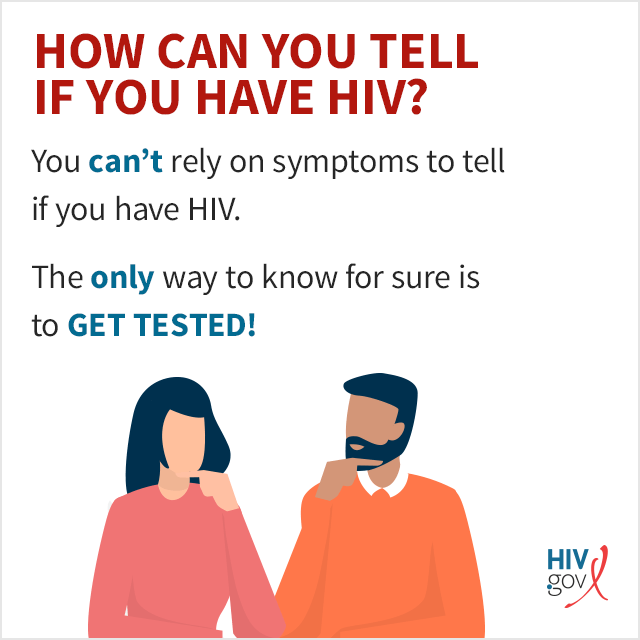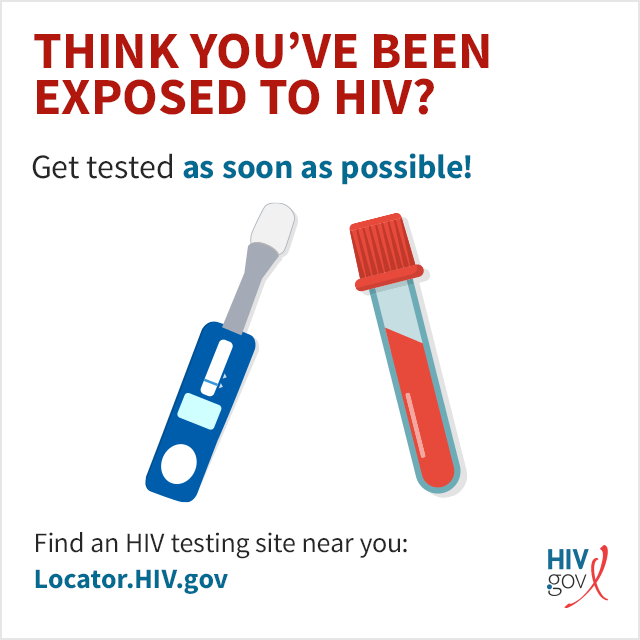Symptoms of HIV
Topics

How Can You Tell If You Have HIV?
The only way to know for sure if you have HIV is to get tested. You can’t rely on symptoms to tell whether you have HIV.
Knowing your HIV status gives you powerful information so you can take steps to keep yourself and your partner(s) healthy:
- If you test positive, you can take medicine to treat HIV. People with HIV who take HIV medicine (called antiretroviral therapy or ART) as prescribed and get and keep an undetectable viral load can live long and healthy lives and will not transmit HIV to their HIV-negative partners through sex. An undetectable viral load is a level of HIV in the blood so low that it can’t be detected in a standard lab test.
- If you test negative, you have more HIV prevention tools available today than ever before, like pre-exposure prophylaxis (PrEP), medicine people at risk for HIV take to prevent getting HIV from sex or injection drug use, and post-exposure prophylaxis (PEP), HIV medicine taken within 72 hours after a possible exposure to prevent the virus from taking hold.
- If you are pregnant, you should be tested for HIV so that you can begin treatment if you're HIV-positive. If you have HIV and take HIV medicine as prescribed throughout your pregnancy and childbirth and give HIV medicine to your baby for 4 to 6 weeks after giving birth, your risk of transmitting HIV to your baby can be less than 1%. HIV medicine will protect your own health as well.
Use the HIV Services Locator to find an HIV testing site near you.
HIV self-testing is also an option. Self-testing allows people to take an HIV test and find out their result in their own home or other private location. You can buy a self-test kit at a pharmacy or online, or your health care provider may be able to order one for you. Some health departments or community-based organizations also provide self-test kits for a reduced cost or for free. Learn more about HIV self-testing and which test might be right for you.
What Are the Symptoms of HIV?
There are several symptoms of HIV. Not everyone will have the same symptoms. It depends on the person and what stage of the disease they are in.
Below are the three stages of HIV and some of the symptoms people may experience.
Stage 1: Acute HIV Infection
Within 2 to 4 weeks after infection with HIV, about two-thirds of people will have a flu-like illness. This is the body’s natural response to HIV infection.
Flu-like symptoms can include:
- Fever
- Chills
- Rash
- Night sweats
- Muscle aches
- Sore throat
- Fatigue
- Swollen lymph nodes
- Mouth ulcers
These symptoms can last anywhere from a few days to several weeks. But some people do not have any symptoms at all during this early stage of HIV.

Don’t assume you have HIV just because you have any of these symptoms—they can be similar to those caused by other illnesses. But if you think you may have been exposed to HIV, get an HIV test.
Here’s what to do:
- Find an HIV testing site near you—You can get an HIV test at your primary care provider’s office, your local health department, a health clinic, or many other places. Use the HIV Services Locator to find an HIV testing site near you.
- Request an HIV test for recent infection—Most HIV tests detect antibodies (proteins your body makes as a reaction to HIV), not HIV itself. But it can take a few weeks after you have HIV for your body to produce these antibodies. There are other types of tests that can detect HIV infection sooner. Tell your doctor or clinic if you think you were recently exposed to HIV and ask if their tests can detect early infection.
- Know your status—After you get tested, be sure to learn your test results. If you’re HIV-positive, see a health care provider as soon as possible so you can start treatment with HIV medicine. And be aware: when you are in the early stage of infection, you are at very high risk of transmitting HIV to others. It is important to take steps to reduce your risk of transmission. If you are HIV-negative, there are prevention tools like pre-exposure prophylaxis (PrEP) that can help you stay negative.
Stage 2: Clinical Latency
In this stage, the virus still multiplies, but at very low levels. People in this stage may not feel sick or have any symptoms. This stage is also called chronic HIV infection.
Without HIV treatment, people can stay in this stage for 10 or 15 years, but some move through this stage faster.
If you take HIV medicine exactly as prescribed and get and keep an undetectable viral load, you can live and long and healthy life and will not transmit HIV to your HIV-negative partners through sex.
But if your viral load is detectable, you can transmit HIV during this stage, even when you have no symptoms. It’s important to see your health care provider regularly to get your viral load checked.
Stage 3: AIDS
If you have HIV and you are not on HIV treatment, eventually the virus will weaken your body’s immune system and you will progress to AIDS (acquired immunodeficiency syndrome).
This is the late stage of HIV infection.
Symptoms of AIDS can include:
- Rapid weight loss
- Recurring fever or profuse night sweats
- Extreme and unexplained tiredness
- Prolonged swelling of the lymph glands in the armpits, groin, or neck
- Diarrhea that lasts for more than a week
- Sores of the mouth, anus, or genitals
- Pneumonia
- Red, brown, pink, or purplish blotches on or under the skin or inside the mouth, nose, or eyelids
- Memory loss, depression, and other neurologic disorders
Each of these symptoms can also be related to other illnesses. The only way to know for sure if you have HIV is to get tested. If you are HIV-positive, a health care provider will diagnose if your HIV has progressed to stage 3 (AIDS) based on certain medical criteria.
Many of the severe symptoms and illnesses of HIV disease come from the opportunistic infections that occur because your body’s immune system has been damaged. See your health care provider if you are experiencing any of these symptoms.
But be aware: Thanks to effective treatment, most people in the U.S. with HIV do not progress to AIDS. If you have HIV and remain in care, take HIV medicine as prescribed, and get and keep an undetectable viral load, you will stay healthy and will not progress to AIDS.